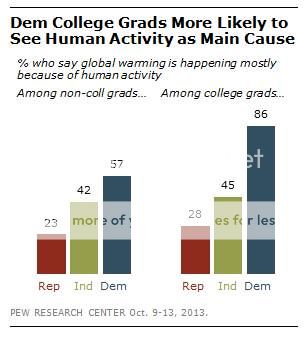
From their overall results, 67% of those surveyed believed that there was solid evidence that the earth is warming. 44% (2/3 of that group) attributed the warming mostly to human activity, and 18% (roughly ¼ of that group) attributed it to natural patterns.
26% of overall adults said that there was no solid evidence, with about the same percentage claiming that we “don’t know enough yet” as claiming that it’s “just not happening.”
As has been consistently the case, there are clear divides between Democrats (and Democratic-leaning Independents) and Republicans (and Republican-leaning Independents). Among the center-left crowd, 84% agreed that there is solid evidence that the earth is warming, and three-fourths of those (64% of the total center-left) attributed the warming to human activity.
We see an interesting divide within the Republican Party, as Pew chose to divide the center-right into Tea Party-identifiers and non-Tea Party identifiers. Among the Tea Party crowd, 70% denied the existence of solid evidence for global warming, and 41% of the Tea Party crowd claimed that global warming “just isn’t happening.” More people said that we “don’t know enough yet” than acknowledged global warming, with only 9% of the total Tea Party crowd recognizing the impact of human activity.
Among the non-Tea Party identifying right, 61% acknowledged that the earth is warming. A slim majority of that contingent (32%) attributed global warming to human activity, whereas about two-fifths (24%) attributed it to natural patterns. 30% of the non-Tea Party center-right crowd claimed that there was no solid evidence, with slightly more leaning toward the argument that scientists don’t know enough yet than toward the claim that global warming is categorically not happening.
The contrast between the two factions produced an interestingly balanced overall picture among the right-of-center world: 46% acknowledging global warming, 46% not—and relatively even splits among the four explanations.
I would caution people, however, against exaggerating the significance of the 61% number among the non-Tea Party right. Only 32% of the non-Tea Party right attributed global warming to human activity. If you don’t view human impact as the main cause, you aren’t likely to agree with prescriptive solutions based on mitigating human impact. The “natural patterns” argument is often espoused by the so-called “moderates” in the Republican Party who don’t want to look as anti-science as the denialists while still adhering to a form of “soft denial.” If you believe that natural patterns alone (or mostly) drive global warming, then you can deny the need to make the systemic changes to energy, agriculture, transportation, land use, consumption patterns, etc., that are needed. You might support some "resilience plans" to address the effects, but if you support any preventative action, it will probably be the costly and ineffective idea of geoengineering.
There is a glimmer of optimism in the graph showing opinions over time, considering that Republican and Democratic numbers are both ticking upwards slightly. Independent numbers, for whatever reason, have dipped recently, but across party affiliations, there has been a significant rebound since 2009-2010, the height of the misinformation campaign.

However, if we start discussing climate politics again (as we were doing then), I’m sure that the numbers will swing downwards again as the fossil fuel-funded denial machine comes back into full swing. The high point was still in 2006, after Al Gore’s An Inconvenient Truth came out in theaters and the issue received its most extensive media attention to date (without as strong of a "he said/she said" political frame, such as that which it received in subsequent years).
It’s interesting to note that more Democrats than ever before (in the span of polling) acknowledge that human impact is the driving force behind global warming. Independent and Republican recognition peaked in 2006 but has recovered partially from the lull in 2009-2010.
I found the data on the effects of education to be particularly noteworthy as well.

As you can see, there is a huge gap (29%) between Democrats with a college education and Democrats without a college education on the question of human impact. Education, however, had minimal effect on Republicans and Independents.
I've read about this correlation between scientific literacy (education) and increased acknowledgment of human influence on climate among Democrats before; however, past polling has at times shown a negative correlation between scientific literacy and belief in human impact on climate among Republicans ( the "smart idiot" effect).
The success of the fossil fuel-funded skepticism-denial machine shows in the responses to the question of whether scientists “generally agree” that human activity causes global warming. As anyone on Daily Kos should know, about 98% of climate scientists (if not more) believe in anthropogenic climate change.

Despite the overwhelming scientific consensus, only 54% of the public thought that scientists “generally agreed” on the matter, with 37% saying that they didn’t. 71% of Democrats—too low in my opinion—correctly recognized the existence of such consensus, with 23% denying it. 41% of Republicans acknowledged the existence of scientific consensus, whereas 48% denied it.
Independents broke in favor of reality (52% to 39%), but not nearly as much as Democrats did. The skepticism-denial misinformation campaign has achieved quite a bit, not without the help of a scientifically illiterate media trapped in a false balance paradigm.
No comments:
Post a Comment